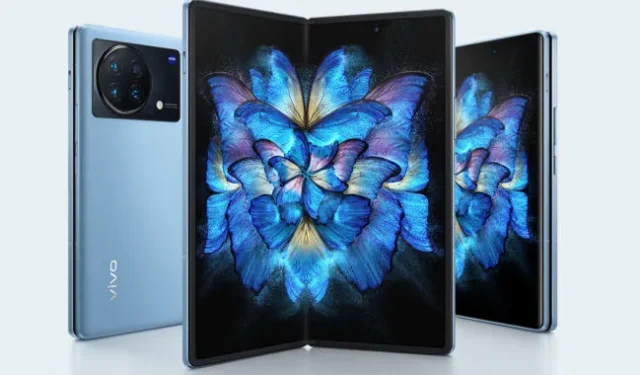Vivo X Fold raises the temperature in Samsung’s foldable lineup

The latest foldable smartphone to hit China is the Vivo X Fold. In fact, it is the first foldable smartphone that can be called the flagship of 2022, with Snapdragon 8 Gen 1 SoC. The phone is sold in China for 8,999 yen, or about $1,400.
This device looks just as good as the Galaxy Z Fold 3, with an 8-inch 120Hz OLED display at 2160×1916 resolution as the main internal display and a 6.53-inch 120Hz OLED display at 2520 resolution × 1080 outside. Apart from the new Qualcomm chip, it has 12GB RAM, 256GB storage, Android 12 build and 4600mAh battery.
For most of our non-Chinese readers, the most interesting thing about Vivo making a foldable model is that it’s a BBK Electronics company, along with Oppo, OnePlus, Realme and iQoo. All BBK companies use the same parts and technology, so it is hoped that OnePlus will someday pick from the BBK parts bin and bring the foldable model to a wider audience. Oppo already entered the foldable market with the Find N in December, and this phone and the Vivo X Fold show just how close China is to catching up with Samsung’s foldable lead.
Almost everything that you consider the technological advantage of the Galaxy Z line has already been implemented by BBK. The 8-inch 120Hz foldable display has an A+ recommendation from Display Mate. The display is covered in “ultra-thin glass”from Schott, the same company that Samsung has partnered with for the Z line. (The ultra-thin glass still has a layer of plastic as its top layer, but the inner flexible glass layer makes the screen more rigid than soft, pure plastic display.)
Oppo can match the prowess of Samsung displays because it uses Samsung. TheElec report states that Samsung Display is the supplier of the Oppo Find N display, so you can bet that Samsung also makes the Vivo display. Samsung is a huge conglomerate made up of various divisions, each with its own CEO, and as reported last year, Samsung Display has completed giving Samsung Electronics exclusive access to its foldable technology. It’s not the best move for Samsung Electronics’ phone market share, but how the Samsung conglomerate makes more moneyby selling components than by selling phones. Your phone might say Apple, Samsung, or OnePlus on the outside, but Samsung makes money no matter what.
Apart from Samsung Display technology, BBK has also surpassed Samsung in integrating in-screen fingerprint scanners into the foldable display. Samsung had to use side-mounted fingerprint readers on the Galaxy Z line, but the Vivo X Fold has two ultrasonic in-display fingerprint readers: one on the smaller outer display and one on the main folding display.
We almost forgot the best part: it also features BBK fast charging technology and can charge at 66W (it comes with an 80W charger, but the official specs say it charges at 66W). For a 4600mAh battery, 66W should be enough to fully charge in less than half an hour. One problem with foldable smartphones is that the hinge in the middle takes up a lot of space that would otherwise be used for the battery. The 4600 mAh battery is quite small for an 8-inch display, but in a foldable body it’s really inevitable. If you are a company with fast charging technology, you have a serious solution to this problem. The need to recharge in the middle of the day is not a big problem if the charging session lasts only 30 minutes.
Samsung Display’s willingness to become a component supplier means that Samsung’s best is being sold to Samsung Electronics’ competitors. If you buy a BBK phone, you can get the best from Samsung and the best from BBK, which makes for a tough combination to compete with Samsung. All we need is BBK to really start selling these things internationally. Hey OnePlus, where’s that foldable?
Leave a Reply